What's New
Displaying results 581 - 590 of 4913
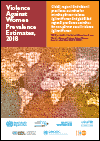
Resource | Publications,
Global, regional and national prevalence estimates for intimate partner violence against women and global and regional prevalence estimates for non-partner sexual violence against women.

Resource | Fact Sheets,
In January 2021, there were 890 confirmed HIV-positive individuals reported to the HIV/AIDS & ART Registry of the Philippines (HARP) and this comprised 1% of the (83,755) total diagnosed cases since January 1984. Moreover, 19% (172) had clinical manifestations of advanced HIV infectiona at the time of testing.
Ninety-six percent (852) of the reported cases were male. Of the total male cases, 3% (24) reported their self-identityc as female (transgender women) at the time of testing.
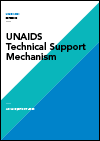
Resource | Publications,
This annual report summarises UNAIDS achievements through the Technical Support Mechanism (TSM) for the October 2019—September 2020 reporting period. It highlights the provision of high-quality technical support to enable countries to respond effectively to the HIV epidemic as a key aspect of UNAIDS ability to deliver on its strategic vision encapsulated in the Fast-Track commitments and targets.
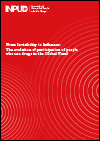
Resource | Publications,
This case study will share the evolution of the participation of people who use drugs in the Global Fund and its national processes. It tells a story of the challenges drug user-led networks face nationally to participate meaningfully in Global Fund proposal development and decision-making. It highlights the progress that has been made with support from the Community, Rights and Gender (CRG) Strategic Initiative (SI). It also showcases the progress, impact and outcomes of people who use drugs participating in the Global Fund, showing the value and effectiveness of both national drug user-led organizations and the key role of the global network in facilitating successful engagement in Global Fund processes. Ultimately, it shows how with the right support, those often left behind can move from invisibility to influence.
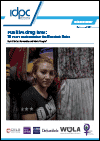
Resource | Publications,
For centuries, criminal laws, justice systems, and prisons have been designed for, and by, men. The 2010 United Nations Rules for the Treatment of Women Prisoners and Non-custodial Measures for Women Offenders, also known as the ‘Bangkok Rules’, break away from this history by establishing the first set of international human rights standards that focus on the specific needs and experiences of women deprived of liberty.
This briefing paper provides analyses the concrete ways in which punitive drug legislation has impacted upon the achievement of the Bangkok Rules, and offers several recommendations on how to translate the commitments set in the Bangkok Rules into drug policy.
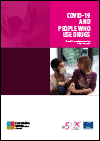
Resource | Publications,
There are many people fighting the COVID-19 pandemic with all their might, but not all of them get much public attention. Among them are the frontline workers who continue to provide much-needed health services to people who use drugs. Every day, they stand up for a group of the most vulnerable people in society: people whose drug dependence often goes hand-inhand with social and health grievances, such as HIV infection, unemployment or homelessness.
Most people who use drugs recognise the seriousness of the current situation. To minimise the risk of COVID-19 infection for themselves and/or others, they show great awareness of the risks and adhere to infection control measures in places where they use drugs or seek help.
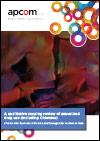
Resource | Publications,
A new scoping review examines sexualized drug use (SDU) among men who have sex with men and transgender women in Asia, in order to understand the socio-sexual context of drug use, to inform effective HIV and drug policy and programmatic responses in Asia, and to guide future qualitative research in the region.
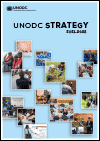
Resource | Publications,
The mission of the United Nations Office on Drugs and Crime (UNODC) is to contribute to global peace and security, human rights and development by making the world safer from drugs, crime, corruption and terrorism by working for and with Member States to promote justice and the rule of law and build resilient societies.
As the world changes and as new challenges and opportunities arise, the present strategy aims to position UNODC to exploit its unique advantages to help achieve this mission. The important and complementary mandates of UNODC distinguish the Office from others in the same field: serving as the guardian of international conventions and the secretariat to global policy bodies; providing strong research and policy analysis; and combining global expertise and a wide field presence to provide specialized assistance to Member States. Strengthened coordination and integration across UNODC will ensure that the normative, research and technical assistance work are mutually reinforcing and able to draw on each other – working to rapidly identify new trends and threats, to develop the responses that are needed to counter them and to share this knowledge and put it into practice to support States.

Resource | Guidelines,
Digital Adaptation Kits (DAKs) are part of the SMART guidelines initiative and include data and health content consistent with WHO’s antenatal care recommendations, generically applicable to digital systems. They are software-neutral, operational, and structured documentation based on WHO clinical, health system and data use recommendations to systematically and transparently inform the design of digital systems. Components include: (1) linked health interventions and recommendations; (2) personas; (3) user scenarios; (4) business processes and workflows; (5) core data elements mapped to standard terminology codes (e.g. ICD); (6) decision support; (7) programme indicators; and (8) functional and non-functional requirements. This DAK focuses on antenatal care (ANC), and is among the different health domains in which DAKs are being developed.
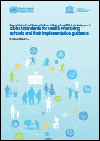
Resource | Publications,
Recent guidance by WHO and other United Nations partners – Global accelerated action for the health of adolescents (AA-HA!): guidance to support country implementation – recommended that “every school should be a health promoting school”. This is in line with the redefinition of school health. A standards-driven approach to the implementation of this recommendation is expected to accelerate global progress by addressing key areas for improvement, as identified at an expert meeting convened by WHO in Bangkok, Thailand, in 2015. One of the priorities identified was to establish systems for collecting better data, monitoring, reporting, providing evidence and utilizing that evidence to make policy and to plan implementation.





